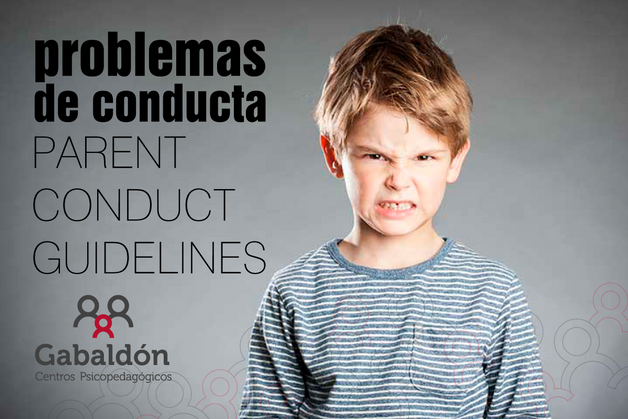
PARENT CONDUCT GUIDELINES
How can we manage the negative behaviors of our children? Are that behaviors so bad or are they normal?
Behaviors of disobedience or negativism are typical because contributes to the right development of our children. In any case, the inappropriate behaviors of our kids need to be manage by their parents, because the way in which the family and the surrounding environment handle these first manifestations of frustration of the child will condition that the tantrums or such behaviors be maintained, disappear or increase.
What can we do?
We need to know that there are a lot of ways to educate our kids, and the way we choose as a parents are crucial in the right development of our kids. For this reason, we encorage you to learn and train to educate with love, because without love we cannot educate in the good way. You have to know that it is possible educate without shout and without force our kids. It is important to correct bad behavior with consequences, but not making our children feel bad, because they need our help. Educating positive is not an easy task, but we can all learn to do it.
Respect for our children is essential, even when things don’t work well and more when our children misbehave. When our children misbehave, they need us, they need consequences, but also, our children need to learn how they can do things right and it is the obligation of the parents to teach their children positive response alternatives.
The first step is establish reasonable, clear and consistent rules so that the child knows clearly what things are allowed and what things are not. The second step is to help your children to identify the emotion that he or she is feeling in the moment of de misbehavior is and after that, teach them how to say with words (talking) the feelings that they have when the moment of that behavior is commited. If your kid doesn’t talk yet, because he or she is 2-3 years old, you only can reafirm the feeling he has, talking to him or her, like this way: “you are upset” or “you are sad”, “it is okay”, “don’t worry, mum understand” or “dad understand that you are ungry”. The emotional validity is so important for the emocional development of our kids.
-
Establish norms and consequences to their misbehaviors (if he hit you or shout you there must be a consequence, let them see that he loses privileges if he or she behaves like this). Time out, send him to his room to reflect. And always remember to encourage your kid to apologize.
-
The rules must always be the same, regardless of where the kid is or with whom he is. If from Monday to Friday we dedicate an hour to review school tasks, or to play with our kid, we cannot skip the time when we don’t feel like it or when we don’t want to do it.
-
Strengthen positive behaviors. Pay attention to your children and praise them when their behavior are appropriate. When a child does not behave correctly, it has to be a consequence, for example, he will not go to the park if he keeps misbehaving, we warn the kid so he can change his behavior, because if your kid change the behavior then he can go to the park. However, we must catch the child by doing good things, since the only way to reinforce and maintain positive behavior is with the child’s attention. Punishment does not cause positive behavior to be learned. It is necessary to use it on specific occasions but the important thing is to teach them alternative behaviors (when the child hits mom, it is better to explain to the child that it bothers you and makes you sad, and teach him a correct behavior, instead of shout or hit, teach them to say: “ mom, I want to talk”.
Alternatives or correct behaviors are the best option to teach the kids how they can behave and what can they do right.
-
Encourage your children to talk about their feelings and let them know appropriate ways to express his anger or frustration. And the most important thing is to listen them in a good way.
-
If the child receives our attention when they are calm, they will not need to resort to tantrums or negative behaviors to get attention. When they have a negative behavior we will not pay attention (extinction) to them, for example, when they do something wrong looking to get your attention to be scolded, we won’t do anything, just wait and ignore the negative behavior. When the child see that you are ignoring him, for sure he will do more and more bad things to try to get your attencion. In fact, if you endure and not fall into the trap, the kid learn that he cannot get your attencion doing bad behaviors. We must extinguish our attention. If we ignore their bad behaviors, our kid will get tired soon enough and then stop. Then, we will reinforce the positive behaviors to teach them how to do things right.
-
Other alternatives when the kids tantrum is to avoid arguing or shouting in front of the boy or girl.
-
Help your children with your example, how to react or behave in hard situations.
-
Promote autonomy and offer options for them to choose instead of making requests or giving orders. “Do you want to drink your milk in the red or green glass?” “Do you want to do your homework here or in the livingroom? Do not give more than two options.
-
Warn in advance when there is going to be a change in activity so they can prepare and get the idea.
-
Explain things to him so he can understand that it is not a whim of yours: you are sick and the only way to cure yourself is by taking the medication (I know you do not like it, it is disgusting), but we have no alternative (do you want to take the mixed medication in juice, water or milk?). We do not fight, we do not force, we only be serious and firm.
-
When something happens and your child hits or yells at you, insults, bites, or disobeys, he has to know that there is a negative consequence behind that behavior. That depending on the situation will be: leave the place where we are, sit in a chair, send it to his or her room, do not play with their favorite toy (time out). We must prevent our son from hitting us (we must establish rules and anticipated consequences, let him know that if he hits mom he loses privileges, such as toys or whatever is established). Take it to a place free of distractions for reflection.
-
We cannot lose our cool, we will always be calm and serious when we have to repress our child’s behavior.
• Teach positive response alternatives.
How to act?
1. Be clear and concise. Define what you want with simple and understandable words. Limit the number of demands.
2. Get the child’s attention.
3. Be gentle in tone and do it safely.
4. Do not give alternatives when something is mandatory.
5. Turn it into a game «Let’s see if we can collect the toys in five minutes.» «Let’s see if you can do the math homework by yourself».
6. Supervise.
7. Praise, praise and praise good behaviors.
8. The misbehaviors must have consequence. Count to 3. Give the child to choose between two alternatives. Use logical consequences.
9. If your kid does not obey you, tell him or her again. If they have a bad behavior you should put a consequence.
10. Tell your child exactly what we want him to do and when we want it. 11. Children need references and limits.
12. Never give in after saying NO. “NO” is non-negotiable.
13. We have to keep promises and threats.
14. We have to respect our kids and educate with love.
Andrea Pelegrín Santo Psicóloga
Máster en Psicología General Sanitaria
Máster en Neuropsicología Clínica
Col. MU02775
Centro Psicopedagógico Gabaldón Alicante





